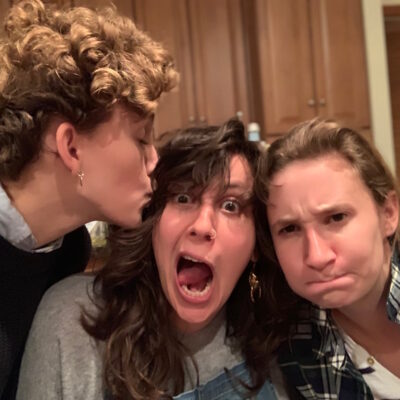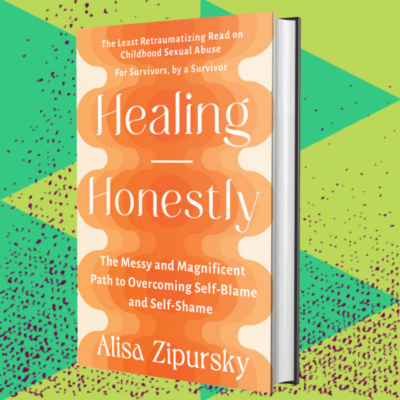This story may contain descriptions of PTSD symptoms, discussion of child sexual abuse, and the effects of trauma.
Here’s why I’m going explain the humor in my healing
The other day I got an email through my site in which the reader pretty much told me that she found it unacceptable that I use GIFs and jokes while talking about healing from childhood sexual abuse. Using phrases like “not believable” and “discrediting the topic,” this reader wanted me to know that there was a right way to be a survivor on the internet, and I wasn’t it.
She wasn’t the first or last person to question why I use the tone I do when I talk about incest and child sex abuse, why I have these GIFs and memes, why I curse, why I smile or why I make myself laugh when I talk about what it means to me to be a survivor. And so, I thought this as good a time as any to explain why humor is an important part of my writing and healing.
Incest isn’t funny. That’s why I have to laugh about it.
If I didn’t laugh about how awful it is to survive incest and live with post-traumatic stress disorder (PTSD), then I’m really not sure how I would function as a human being on this earth. Humor is actually a really important way for me to claim my own story and decide what it means to me. Making a joke that may cause others to cringe (sometimes very fun!) is how I can control my narrative. You aren’t feeling sorry for me if you’re laughing with me. You’re not pitying me if you’re laughing with me. You’re not super creeped out thinking about incest and worried you’ll never be able to talk to me normally again if you’re laughing with me.
I don’t want anyone’s pity; I want people’s understanding. And believe it or not, a great way to help people understand is to use humor. Humor can make people uncomfortable (thus giving you the upper hand), but it can also ease people into a conversation that, due to stigma and unfamiliarity, they may be otherwise super unwilling to talk about.
And not to, like, overwhelmingly toot my own horn, but if you watch my Moth Story you’ll see how I use humor to ease 1,200 unsuspecting people into thinking about and understanding what it means for me to be a childhood sexual abuse survivor.
I’m Jewish, we use humor to survive
In case I haven’t mentioned this yet, I am a proud Jewess (insert joke about horns and drinking the blood of Christian babies…Fuck, I’m using humor inappropriately again to cope with 5,000 years of suffering). You didn’t ask, but my faith doesn’t really give me much in terms of comfort or understanding about the trauma I’ve endured in my life. But my community, my ancestry and the history of my people gives me a lot, with perhaps my favorite ingrained value being how we, as a people, have historically used humor to survive pain and suffering. So to keep adding layer upon layer to this whole trauma thing, telling me, a Jew, not to use humor to talk about my survivorship is kind of fucked.
We’ve all agreed these guys are Jewish, right?
“If they’re laughing, how can they bludgeon you to death?”- Mel Brooks
While we’re on the topic of Jews and comedy, let me take this opportunity to say a special FUCK WOODY ALLEN (it’s important to take any and all opportunities to state this whenever possible, you all know I’ll never pass up the chance.) He is a Jewish humor hero to so many, and he also sexually abused his stepdaughter Dylan Farrow. As a double aside, if we want to see how far we have to go as a society with the #MeToo movement and reckoning with child sex abuse and incest, let’s look at how Woody Allen still gets his movies made and is accepted in Hollywood as well as Jewish society. So, just one more time while it’s still relevant to the conversation: FUCK WOODY ALLEN. Okay, back to the topic at hand.
Humor can make healing feel way less scary
Showing up as a survivor means showing up in my full self. And honestly, I think I’m pretty funny. So to silence that side of me, to deny those voices in my head making the fart jokes and the Mean Girls references, would be me silencing whole swaths of myself in order to feel like I can speak about my survivorship. And that sounds like a stone cold bummer..
Humor helps me fight against the urge to isolate myself in my trauma. When I’m with my friends and I feel like shit, I don’t feel like I have to go home and hide myself away because I don’t have it in me to smile. Instead, I can tell my friends that I just had terrible nightmares, so I’m fucked, but I want to be here, finishing it off with my classic line of “PTSD, what a fun and sexy time.” My friends can tell from my humor that I’m still me, even though I’m in pain, and we don’t have to be afraid to talk about it. It’s how I’ve learned to be resilient and continue living my life, even when things hurt so much. I am not saying it’s how you should heal; it is not a recommendation or a suggestion. Instead, I am simply explaining what works for me, how I survive, and how I heal.
This feels like a good time to say that it has been so awesome to hear from so many of you for whom humor is a big way you heal too. I’ve heard so many of you say that the GIFs and silly jokes made your trauma feel more accessible to you and made seeking community feel way less scary. Thank you for sharing that with me.
There is no “right” way to be a survivor
I have empathy for the people who’ve written the messages asking me to stop using humor in my stories. It is clear they are survivors too. With so few of us openly talking about child sex abuse on the internet, it can feel like you’re desperate to find someone who talks about their survivorship the way you do (which I relate to, and was a huge reason I started Healing Honestly). Maybe they felt desperate to be able to see themselves in someone else’s writing and my humor made them feel isolated. For many people, humor is not part of their healing. That’s their own journey and I support them in that.
All of that can be true while, at the same time, policing the way I speak about my survivorship is really fucked up. Sometimes we need to check each other and the way we talk about our survivorships (something I’ve written about here), but that’s mainly about when we weaponize our victimhood to abuse or oppress others. But to police each other’s way of healing, and to accuse me of not being “believable” in the way that I talk about my healing, is really toxic and bringing rape culture, which tells us there’s a right way to be a survivor and be believed, directly into my inbox.
I don’t try to be for everyone. I write in my voice, which reflects my lived experiences and the intersections of my identities as a white, cis, hetero, city-dwelling 30-year-old Jewish woman. It’s totally cool if it isn’t your jam; this here is just a website I established that’s free for anyone who does jam with it. Believe you me, there are many sites out there that talk about healing from sexual violence without an ounce of humor and that’s totally cool too; I know others will connect with that narrative even if it isn’t for me. It’s why I support any of you wanting to start your own blogs or explore other ways you can express yourself and your survivorship. I certainly can’t reflect all the ways different people feel about their survivorship, and trust me, you wouldn’t want me to.
I wanted to close this with a quote from the brilliant Hannah Gadsby from her groundbreaking Netflix special Nanette:
“Laughter is not our medicine. Stories hold our cure. Laughter is just the honey that sweetens the bit of medicine. I don’t mean to unite you with laughter or anger. I just needed my story heard and understood by individuals with minds of their own. “
Want me to come speak at your event or facilitate a workshop?
I travel around the country giving talks, facilitate workshops and engaging on panels on the topics of healing from sexual trauma and supporting survivors. I promise, it’s more fun than you’d think. I’d love to speak at your event! Just shoot me an email through my contact page and we can talk about working together.

